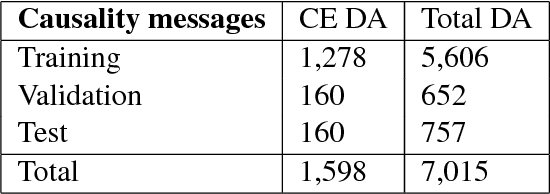Causal Explanation Analysis on Social Media
Paper and Code
Oct 18, 2018



Understanding causal explanations - reasons given for happenings in one's life - has been found to be an important psychological factor linked to physical and mental health. Causal explanations are often studied through manual identification of phrases over limited samples of personal writing. Automatic identification of causal explanations in social media, while challenging in relying on contextual and sequential cues, offers a larger-scale alternative to expensive manual ratings and opens the door for new applications (e.g. studying prevailing beliefs about causes, such as climate change). Here, we explore automating causal explanation analysis, building on discourse parsing, and presenting two novel subtasks: causality detection (determining whether a causal explanation exists at all) and causal explanation identification (identifying the specific phrase that is the explanation). We achieve strong accuracies for both tasks but find different approaches best: an SVM for causality prediction (F1 = 0.791) and a hierarchy of Bidirectional LSTMs for causal explanation identification (F1 = 0.853). Finally, we explore applications of our complete pipeline (F1 = 0.868), showing demographic differences in mentions of causal explanation and that the association between a word and sentiment can change when it is used within a causal explanation.
 Add to Chrome
Add to Chrome Add to Firefox
Add to Firefox Add to Edge
Add to Edge